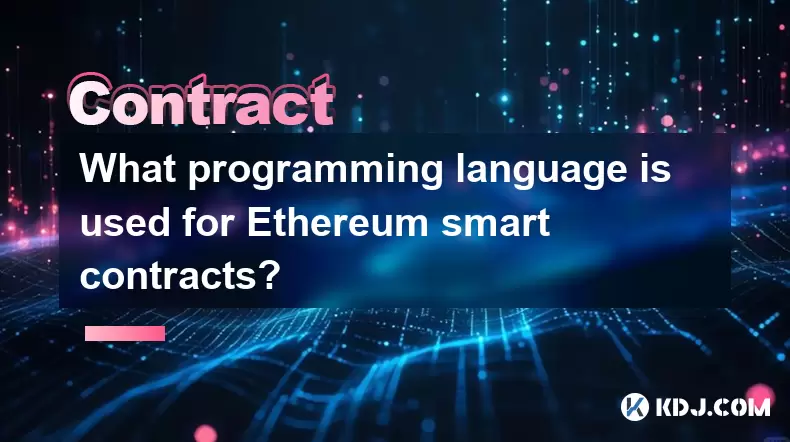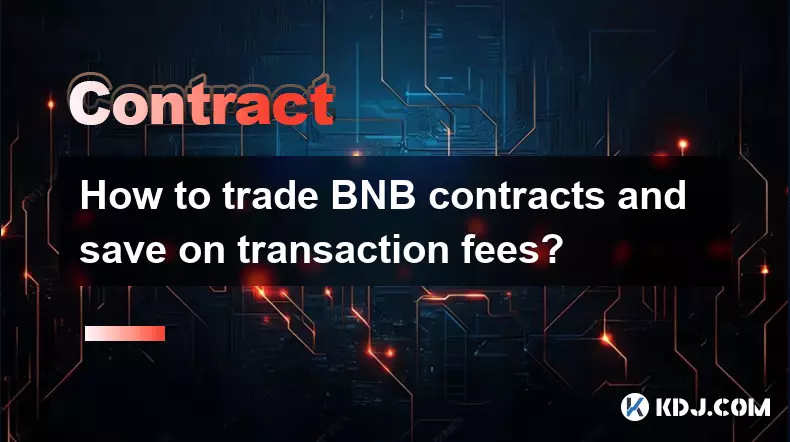-
 bitcoin
bitcoin $87959.907984 USD
1.34% -
 ethereum
ethereum $2920.497338 USD
3.04% -
 tether
tether $0.999775 USD
0.00% -
 xrp
xrp $2.237324 USD
8.12% -
 bnb
bnb $860.243768 USD
0.90% -
 solana
solana $138.089498 USD
5.43% -
 usd-coin
usd-coin $0.999807 USD
0.01% -
 tron
tron $0.272801 USD
-1.53% -
 dogecoin
dogecoin $0.150904 USD
2.96% -
 cardano
cardano $0.421635 USD
1.97% -
 hyperliquid
hyperliquid $32.152445 USD
2.23% -
 bitcoin-cash
bitcoin-cash $533.301069 USD
-1.94% -
 chainlink
chainlink $12.953417 USD
2.68% -
 unus-sed-leo
unus-sed-leo $9.535951 USD
0.73% -
 zcash
zcash $521.483386 USD
-2.87%
What programming language is used for Ethereum smart contracts?
Ethereum smart contracts, primarily written in Solidity, enable decentralized applications by executing code on the Ethereum Virtual Machine.
Jul 26, 2025 at 11:29 am

Understanding Ethereum Smart Contracts
Ethereum smart contracts are self-executing contracts with the terms of the agreement directly written into code. These contracts run on the Ethereum Virtual Machine (EVM), which is a decentralized computing environment. The primary language used to write Ethereum smart contracts is Solidity, although other languages such as Vyper and Yul are also supported to varying degrees.
Solidity is the most widely adopted language due to its object-oriented syntax, which is similar to JavaScript and C++. It is specifically designed for developing smart contracts on the Ethereum platform.
Why Solidity Is the Preferred Language
Solidity's dominance in the Ethereum ecosystem stems from its robust tooling and community support. It is actively maintained by the Ethereum Foundation and has a large developer community contributing to its evolution. The language supports complex features such as inheritance, libraries, and user-defined types, which are essential for building sophisticated decentralized applications (dApps).
- Tool Integration – Solidity works seamlessly with development frameworks like Truffle and Hardhat, making deployment and testing more efficient.
- Comprehensive Documentation – The Ethereum community provides extensive documentation, tutorials, and forums for developers learning Solidity.
- Wide Adoption – Many high-profile decentralized finance (DeFi) projects and non-fungible token (NFT) platforms are built using Solidity.
Exploring Alternative Languages for Ethereum Smart Contracts
While Solidity is the most popular, developers have the option to use other languages that compile to EVM bytecode.
- Vyper – A Pythonic language designed for security and simplicity. It intentionally omits certain complex features found in Solidity to reduce the risk of vulnerabilities.
- Yul – A low-level intermediate language that allows for fine-grained control over gas usage and execution efficiency. It can be used alongside Solidity for optimization.
- LLL (Lisp-Like Language) – A minimalistic language that compiles directly to EVM opcodes. It is less commonly used due to its steep learning curve and limited tooling.
How to Write a Basic Smart Contract in Solidity
Creating a simple smart contract in Solidity involves defining a contract structure, declaring variables, and implementing functions. Here's a step-by-step example of a basic contract that stores a number.
- Open a Solidity IDE like Remix (https://remix.ethereum.org).
- Create a new file and name it SimpleStorage.sol.
- Paste the following code into the editor:
pragma solidity ^0.8.0;
contract SimpleStorage {
uint storedData; function set(uint x) public { storedData = x; } function get() public view returns (uint) { return storedData; }}
- Click on the Compile tab and ensure there are no errors.
- Go to the Deploy & Run Transactions tab and deploy the contract to the JavaScript VM environment.
- Use the set function to store a value and the get function to retrieve it.
Best Practices for Writing Secure Smart Contracts
Security is paramount when developing smart contracts because vulnerabilities can lead to irreversible financial losses. Developers must follow best practices to minimize risks.
- Use Well-Audited Libraries – Leverage established libraries like OpenZeppelin to handle common functionalities such as token standards and access control.
- Avoid Reentrancy Vulnerabilities – Ensure that external calls are made after all internal state changes to prevent reentrancy attacks.
- Implement Proper Error Handling – Use require(), revert(), and assert() statements to handle errors gracefully and avoid unexpected behavior.
- Conduct Thorough Testing – Use testing frameworks like Truffle or Hardhat to simulate contract behavior and detect issues before deployment.
- Use Formal Verification Tools – Tools like CertiK and MythX can help verify contract logic and identify potential exploits.
Frequently Asked Questions
Can I use JavaScript to write Ethereum smart contracts?No, JavaScript cannot be used directly to write Ethereum smart contracts. However, it is commonly used in conjunction with Solidity for front-end development and interacting with smart contracts via web3 libraries like Web3.js or Ethers.js.
Is Vyper better than Solidity for security?Vyper is designed with a focus on simplicity and security by omitting complex features like inheritance and inline assembly. While this can reduce the attack surface, it may not be suitable for every project. The choice between Vyper and Solidity depends on the specific requirements and complexity of the contract.
Do I need to know other languages before learning Solidity?Familiarity with object-oriented programming concepts and languages like JavaScript or Python can help in understanding Solidity syntax and logic. However, it is not mandatory, and many developers learn Solidity as their first programming language.
What tools are essential for developing Ethereum smart contracts?Essential tools include Remix IDE, Truffle Suite, Hardhat, OpenZeppelin libraries, and testing frameworks like Mocha and Chai. Additionally, using a blockchain explorer like Etherscan is crucial for monitoring contract deployments and transactions.
Disclaimer:info@kdj.com
The information provided is not trading advice. kdj.com does not assume any responsibility for any investments made based on the information provided in this article. Cryptocurrencies are highly volatile and it is highly recommended that you invest with caution after thorough research!
If you believe that the content used on this website infringes your copyright, please contact us immediately (info@kdj.com) and we will delete it promptly.
- Vitalik Buterin Rethinks Ethereum's Future: L2s Evolve Beyond Shards as Ethereum Scales
- 2026-02-04 15:35:01
- Ozak AI Fuels Network Expansion with Growth Simulations, Eyeing Major Exchange Listings
- 2026-02-04 12:50:01
- From Digital Vaults to Tehran Streets: Robbery, Protests, and the Unseen Tears of a Shifting World
- 2026-02-04 12:45:01
- Bitcoin's Tightrope Walk: Navigating US Credit Squeeze and Swelling Debt
- 2026-02-04 12:45:01
- WisdomTree Eyes Crypto Profitability as Traditional Finance Embraces On-Chain Innovation
- 2026-02-04 10:20:01
- Big Apple Bit: Bitcoin's Rebound Hides a Deeper Dive, Say Wave 3 Watchers
- 2026-02-04 07:00:03
Related knowledge

How to close a crypto contract position manually or automatically?
Feb 01,2026 at 11:19pm
Manual Position Closure Process1. Log into the trading platform where the contract is active and navigate to the 'Positions' or 'Open Orders' tab. 2. ...

How to understand the impact of Bitcoin ETFs on crypto contracts?
Feb 01,2026 at 04:19pm
Bitcoin ETFs and Market Liquidity1. Bitcoin ETFs introduce institutional capital directly into the spot market, increasing order book depth and reduci...

How to trade DeFi contracts during the current liquidity surge?
Feb 01,2026 at 07:00am
Understanding Liquidity Dynamics in DeFi Protocols1. Liquidity surges in DeFi are often triggered by coordinated capital inflows from yield farming in...

How to use social trading to copy crypto contract experts?
Feb 02,2026 at 07:40am
Understanding Social Trading Platforms1. Social trading platforms integrate real-time market data with user interaction features, enabling traders to ...

How to trade BNB contracts and save on transaction fees?
Feb 03,2026 at 12:39am
Understanding BNB Contract Trading Mechanics1. BNB contracts are derivative instruments traded on Binance Futures, allowing users to gain leveraged ex...

How to build a consistent crypto contract trading plan for 2026?
Feb 02,2026 at 10:59pm
Defining Contract Specifications1. Selecting the underlying asset requires evaluating liquidity depth, historical volatility, and exchange support acr...

How to close a crypto contract position manually or automatically?
Feb 01,2026 at 11:19pm
Manual Position Closure Process1. Log into the trading platform where the contract is active and navigate to the 'Positions' or 'Open Orders' tab. 2. ...

How to understand the impact of Bitcoin ETFs on crypto contracts?
Feb 01,2026 at 04:19pm
Bitcoin ETFs and Market Liquidity1. Bitcoin ETFs introduce institutional capital directly into the spot market, increasing order book depth and reduci...

How to trade DeFi contracts during the current liquidity surge?
Feb 01,2026 at 07:00am
Understanding Liquidity Dynamics in DeFi Protocols1. Liquidity surges in DeFi are often triggered by coordinated capital inflows from yield farming in...

How to use social trading to copy crypto contract experts?
Feb 02,2026 at 07:40am
Understanding Social Trading Platforms1. Social trading platforms integrate real-time market data with user interaction features, enabling traders to ...

How to trade BNB contracts and save on transaction fees?
Feb 03,2026 at 12:39am
Understanding BNB Contract Trading Mechanics1. BNB contracts are derivative instruments traded on Binance Futures, allowing users to gain leveraged ex...

How to build a consistent crypto contract trading plan for 2026?
Feb 02,2026 at 10:59pm
Defining Contract Specifications1. Selecting the underlying asset requires evaluating liquidity depth, historical volatility, and exchange support acr...
See all articles










































































